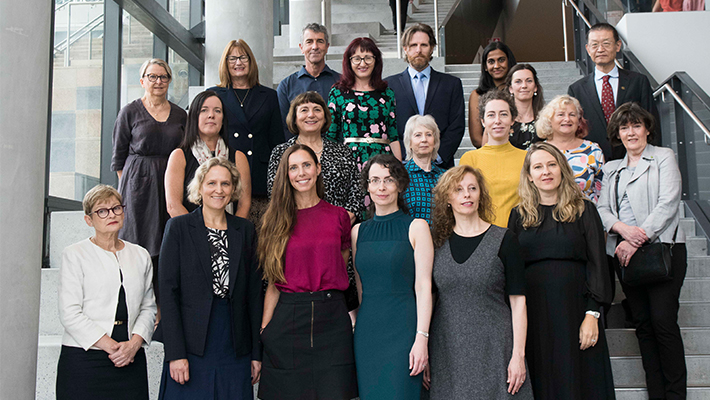Today, 24 September, is World Cancer Research Day – a day to recognise the impact of research on reducing cancer incidence and improving outcomes. In Australia, research led improvements in cancer prevention, early detection, screening and treatment are estimated to have saved around 107,000 lives over the past 20 years.
To mark the day, we asked the Daffodil Centre’s stream leads to reflect on what makes them optimistic about the future of cancer control. Here’s what they had to say:
“I’m so optimistic about the future of cancer control especially when I interact with developing cancer researchers, including our team at the Daffodil Centre. I am privileged to work alongside many talented and proficient researchers and professional staff at all levels. At the Daffodil Centre we plan to contribute to training and supporting emerging cancer researchers – this is so important because our younger researchers are the future of cancer control.”
Professor Karen Canfell, Director, The Daffodil Centre
“Diversifying population-level interventions to reduce the risk of cancer and to improve care for people affected by cancer.”
Professor Nehmat Houssami, Stream lead Breast Cancer Clinical and Population Health
“Our increasing ability to test for genetic changes that predispose to cancer is leading to increased opportunities for targeted cancer prevention. This makes me optimistic about the future of cancer control.”
Professor Anna deFazio, Stream lead Ovarian Cancer
“We have seen great strides in prostate cancer control in the last two decades, but we need more evidence about risk factors, we need to be smarter in early detection and testing and we still have much to do in supporting survivors. Working with and mentoring the next generation of cancer researchers gives me great confidence that we can rise to these challenges.”
Associate Professor David Smith, Stream lead Prostate Cancer
“I’m optimistic about the future of cancer control because we’re getting better at bringing together discoveries from different areas of research to reduce the burden of cancer. From prevention through to screening, diagnosis and treatment, we’re finding ways to use the best available evidence to personalise health advice and healthcare.”
Associate Professor Carolyn Nickson, Stream lead Breast Cancer Policy and Evaluation
“I am optimistic that we can close the gap in cervical cancer outcomes by making screening more flexible. Offering all women the option to collect their own screening sample would give women more choice and control.”
Associate Professor Megan Smith, Co-lead Cervical Cancer and HPV stream (high income countries)
“WHO’s global strategy to accelerate the elimination of cervical cancer can help make the elimination of this cancer a reality for all countries. This makes me optimistic about the future of cancer control.”
Dr Kate Simms, Co-lead Cervical Cancer and HPV stream (low and middle income countries)
“The way researchers from across the globe have come together to understand and control the COVID-19 pandemic makes me optimistic. Our health experts have an amazing capacity to innovate and inspire. I am more motivated than ever to apply this to cancer control. Australia is a rich learning environment and we can build on and add to the knowledge of our international colleagues.”
Dr Eleonora Feletto, Stream lead Gastrointestinal Cancers Policy and Evaluation
“Advances in technology and the way we communicate and share information mean that researchers, clinicians, policy-makers and community are finding a common language which is accelerating the pathway from evidence to impact. This makes me optimistic about the future of cancer control and is a key foundation of the Daffodil Centre.”
Dr Marianne Weber, Stream lead Lung Cancer Policy and Evaluation
World Cancer Research Day is an international initiative led by the Spanish Association Against Cancer, coordinated by 10 organizations, including the International Agency for Research on Cancer and the Union for International Cancer Control, and supported by 105 entities and more than 600,000 people.




